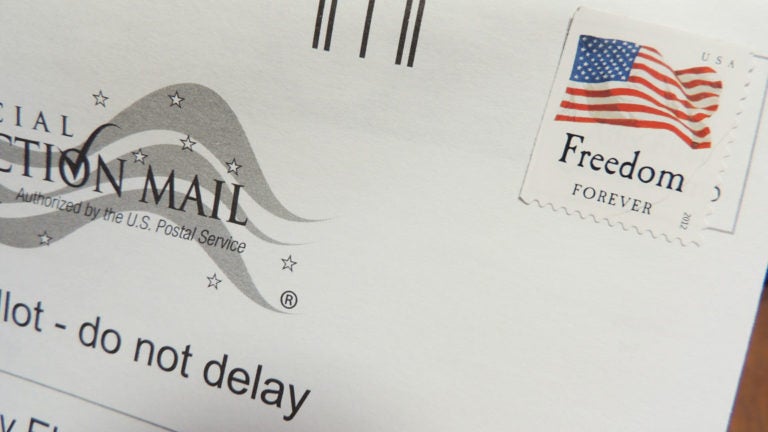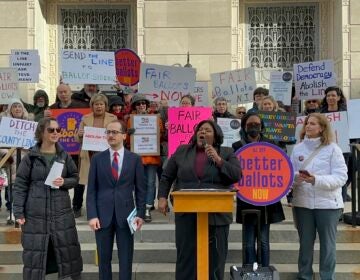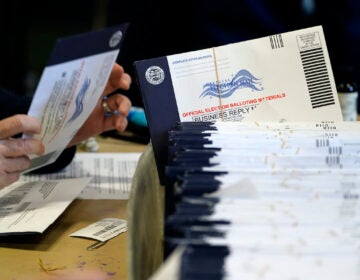Vote-by-mail ballots for primary election could come a week later in N.J.
Bill would extend mailing deadline to April 25 to give county clerks enough time to process expected rise in mail-in ballot requests

As of the end of last year, clerks had processed 552,000 requests for mail-in ballots statewide. (Upupa4me from Flickr)
This article originally appeared on NJ Spotlight.
–
New Jerseyans who vote by mail could get their primary election ballots a week later this year under legislation meant to give county clerks enough time to get the hundreds of thousands of ballots printed and mailed.
But lawmakers will need to act quickly to advance the measure (S-1982), as the current deadline for mailing out primary ballots is just six weeks away.
This is the first presidential election since state lawmakers expanded the mailing of absentee ballots over the last two years, and with presidential turnout higher than for any other election, clerks are expected to be swamped trying to send out recurring mailed ballots, in addition to new requests. By law, mail-in ballots are supposed to be sent 45 days prior to an election, but this year, that would give clerks only four days in which to prepare, print, proof and mail out ballots.
The Senate State Government, Wagering, Tourism & Historic Preservation Committee on Thursday unanimously approved the bill, sponsored by committee chairman James Beach (D-Camden), which would extend the mailing deadline by one week — to April 25, instead of April 18 — for all but ballots mailed to military voters and those overseas. Federal law requires those to be sent 45 days before an election.
Mary Melfi, clerk in Hunterdon County and legislative liaison for the Constitutional Officers Association of New Jersey, said the change is needed.
“The way the law currently reads, there is no way we would be able to deal with the volume,” said Melfi.
More requests for mail-in ballots
As of the end of last year, clerks had processed 552,000 requests for mail-in ballots statewide, she said. And with heightened interest in presidential elections, that number is expected to rise. Melfi said that in Hunterdon County, which has just 101,000 registered voters, she is receiving between six and 12 requests for vote-by-mail ballots every day.
“We’re all happy there’s greater voter access, but the voter access has created implementation challenges,” Melfi told the committee.
Two laws the Democratic-controlled Legislature passed in 2018 and 2019, which Gov. Phil Murphy then signed, substantially increased the number of mail-in ballots the clerks send out by requiring them to automatically mail ballots to those who voted by mail in prior elections unless they opted out of the process.
This has led to an increase in the proportion of those votes cast by mail. Almost 17% of all ballots cast last November were done by mail-in ballots, compared to less than 3% in 2003, the first year the law allowing widespread use of the ballots took effect, according to data from the state Division of Elections. In last June’s primary, close to 23% of all those who voted used a mail-in ballot — a record.
At the same time, however, the requirement to mail out these ballots has increased costs and the workload for county clerks’ offices. The little-known Council on Local Mandates ruled those laws invalid soon after last November’s election because the state had not given the clerks money to carry out the law. Now the state is giving the counties $5 million to handle the cost, Melfi said.
Tight deadlines
But being able to afford additional staff will not necessarily enable the clerks to meet the current deadline. Due to other election dates mandated by law and the fact that the drawing of ballot positions falls on the Good Friday holiday, the clerks would have a short timeframe for getting all their ballots drafted, proofed, printed and stuffed into envelopes for mailing. This is especially true for counties where party committee seats are on the ballot — in Hunterdon, for instance, Melfi said that she will have 232 different ballots to create, check and send out to voters in the county’s 26 municipalities.
Melfi said the timeframe is still going to be tight — the clerks had hoped to get even more time — but the clerks will make it work.
Beach, a former county clerk, had introduced a bill that would have moved all the primary election deadlines back by two weeks. That bill (S-4306) had begun moving near the end of the last legislative session, but it screeched to a halt over opposition to another one of its provisions — to allow county boards of election to begin opening and counting mail-in ballots seven days before polls closed. While the bill required that the results of the early counts remain confidential, some elected officials and activists feared that might not happen — and that the leaking of early results could wind up influencing Election Day voters and skew who wins.
Even delaying the mailing of ballots to 38 days before the election, New Jersey would be the first state in the nation to send out ballots, according to Burlington County Clerk Wade Hale.
The presidential race tops this year’s balloting, followed by Democratic U.S. Sen. Cory Booker’s seat and all dozen U.S. House of Representatives seats, and county and local races. Federal elections typically draw more voters than state elections. In 2016, 68% of all those registered voted in the general election, compared with 39% in the 2017 gubernatorial election and 27% in last year’s state Assembly races.
In 2016, more than 355,000 people voted by mail — about 9% of all ballots cast — but that was before the state expanded the automatic mailing of ballots.
The bill is now poised for passage by the Senate, but it will also have to make it through the Assembly and be signed by Murphy in short order if it is to be in place in time to help the clerks.
Melfi said that clerks met with members of the Governor’s Office to stress the importance of the bill and ask that, if the bill passes both houses, Murphy “quickly sign the bill.”
WHYY is your source for fact-based, in-depth journalism and information. As a nonprofit organization, we rely on financial support from readers like you. Please give today.




